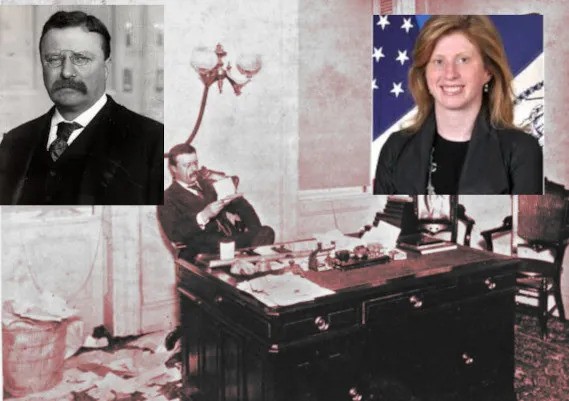|
Getting your Trinity Audio player ready...
|
Gary Tilzer
Teddy Roosevelt and Jessica Tisch, separated by more than a century, share striking parallels as reform-minded leaders from prominent New York families with a remarkable ability to open doors. Both took the helm of the NYPD during periods of profound crisis. Both inherited a department plagued by corruption, low morale, and dysfunctional leadership, at pivotal moments when New York City grappled with high crime rates and complex political challenges that threatened public safety and the city’s future. Each NYPD leader faced the daunting challenge of reducing crime, overhauling a deeply entrenched and corrupt institution, and maneuvering through New York’s toxic political landscape to safeguard the city they were sworn to protect— all while earning and maintaining the trust and respect of a public seething with anger over the rampant crime that plagued their city’s streets, subways and lowered the quality of their lives.
Roosevelt’s tenure as Police Commissioner in the 1890s saw him confront entrenched corruption, inefficiency, and political interference within the NYPD, a force controlled by Tammany Hall’s politicians. His focus on merit-based promotions, rigorous standards for officers, new technology, and personal oversight—famously conducting “midnight rambles” patrolling the streets all night to ensure police accountability. Roosevelt failed at defeating Tammany Hall control of the NYPD, but he did set the standard of professionalism for the NYPD, rooted in integrity, accountability, community policing, and respect for the public—principles that that the department to this day strugles to achieve.
Jessica Tisch, is stepping into the role of NYPD commissioner during a modern era of NYPD in crisis, during a highly competitive mayoral election, faces a range of management and political challenges similar to those Roosevelt confronted. From serious allegations of supervisory corruption and misconduct to challenges of low morale, recruitment, force shortages, and political interference that undermined efforts to keep the public safe. Yet, just two months into her tenure, she has got off to the right start by taking bold action to reform the department. Her focus on removing corrupt NYPD leadership during her first month on the job, using modern technology she put in place, helped captured the CEO murder Luigi Mangione, and reinstituting merit promotions by stoping the transfer of 500 officers, reflects Roosevelt’s own commitment to restoring the NYPD’s credibility and efficiency.
Like Roosevelt Tisch faces a political firestorm that she will not be able to defeat and has to use all her skills not be caught up in. Roosevelt rose above the shifting political winds by steadfastly adhering to his reform message, avoiding the traps of political posturing or empty rhetoric. He remained unwaveringly honest with New Yorkers, forging a bond of trust through his commitment to what famously evolved into his “square deal,” his demestic agenda. Tisch would build trust with New Yorkers if she starts avoiding political spin like crime is down and it is the public perception that is the problem, and other public relations spins that talks down to the public.
Meet Jessica Tisch, the new New York City Police Commissioner. Yes, Tisch like the NYU school of arts and Tisch Cancer Institute. Her grandfather & his brother founded Lowes
This lady is an heir to billionaires (her father, grandmother, uncle are all billionaires) pic.twitter.com/XPasbSnQuL
— meat beat manifesto (@AcidAunt) December 20, 2024
Teddy Roosevelt’s Era of NYPD Forced Reform
When Teddy Roosevelt took charge of the NYPD in 1895, the department was a breeding ground for corruption and dysfunctional leadership. A Republican mayor, William Strong, had been motivated to reorganize the department after the Lexow Committee, a state legislative investigation, exposed endemic inefficiency and officers extorting protection money from local merchants and cop on the beat turning a blind eye to illegal activities in exchange for bribes. Revelations of officers taking hush money from brothels and saloons caused public outrage, led by journalists and reformers pointing to the influence of Tammany Hall, the powerful Democratic political machine, as the root of the problem.
Update: Gotham’s bad old days are back I was a New York cop. I saw what went wrong Nine NYPD sleuths move to NYC Department of Investigation to work corruption cases following sex-for-OT scandal How Maddrey Became the N.Y.P.D.’s Top Officer Despite Years of Scandal
Jessica Tisch: Confronting Similar Forced Call to Reform the NYPD and Political Challenges as Roosevelt

Fast forward to today, Commissioner Tisch faces a crisis within the NYPD that bears a striking resemblance to the challenges Roosevelt confronted. However, this crisis is exacerbated by modern interpretations of Roosevelt’s progressive ideals—ironically distorted by socialist-leaning elected officials who dominate New York’s government and elections. These socialist political leaders have departed from Roosevelt’s foundational commitment to public safety, prioritizing ideological agendas—such as the defund-the-police movement in the City Council and no-bail policies in Albany—over the safety and well-being of New Yorkers and the city. This has left Commissioner Tisch to navigate a landscape of policies that not only undermine the NYPD’s ability to protect and serve effectively but also violates the City Charter mandate for the NYPD to safeguarding the city and its citizens.
Appointed by Mayor Adams just last month, Tisch stepped into a department mired in scandal, including a “sex for overtime” controversy involving NYPD supervisors in Mayor Adams’ inner circle, compounded by l ow morale, low recruitment levels, staff shortages, and pervasive political interference by woke Albany and the City Council. Tisch also inherited an NYPD grappling with negative press stories and NYPD supervisory dysfunction. This time, the surge in crime is not driven by a corrupt police force, but by ideologically-driven progressive policies, including the no-bail law, sanctuary city regulations, and defunding the police measures. Much like Roosevelt before her, Tisch must navigate NY’s anything goes politics to restore integrity and functionality to the department, to protect New Yorkers and safeguard the city’s future.
Much like Roosevelt, who rose to prominence following an investigation into Tammany Hall corruption where bribery ran rampant within the NYPD, Commissioner Tisch assumed leadership in the wake of explosive allegations of misconduct within the department. Notably, prior to Tisch’s appointment, a scandal surfaced involving lobbyist James Caban, the twin brother of ousted Police Commissioner Edward Caban, who allegedly attempted to extort $2,500 from Brooklyn bar owner Shamel Kelly to resolve issues with the department. This modern-day bribery case echoes the Tammany Hall corruption Roosevelt confronted, highlighting the enduring need for strong, principled leadership and unwavering transparency to restore integrity to the NYPD.
Crisis Parallels Between the Roosevelt and Tisch Eras
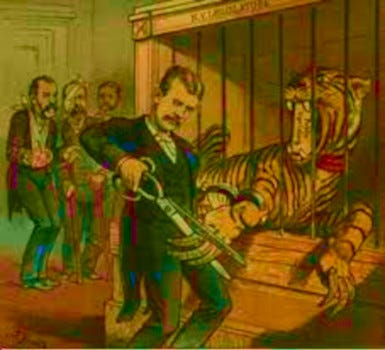
Roosevelt faced a force deeply embedded in systemic Tammany Hall corruption, while Tisch must rebuild a department wrecked by lack of professional leadership, low morale and a workforce that wants to retire or transfer out to another police department.
While the challenges differ in nature—19th-century graft by the entire force versus 21st-century pay for play supervisors’ scandals and recruitment struggles—the underlying theme is the same: a need for transformative leadership to restore public confidence, rise above politics and reforming the department to effectly reduce crime. Just as Roosevelt’s reforms reshaped the NYPD into a more disciplined and professional modern organization, Tisch’s tenure represents an opportunity and need to confront today’s challenges with the same leadership decisive action as Roosevelt.
Roosevelt’s “Midnight Rambles” vs. Tisch’s Modern NYPD Purges
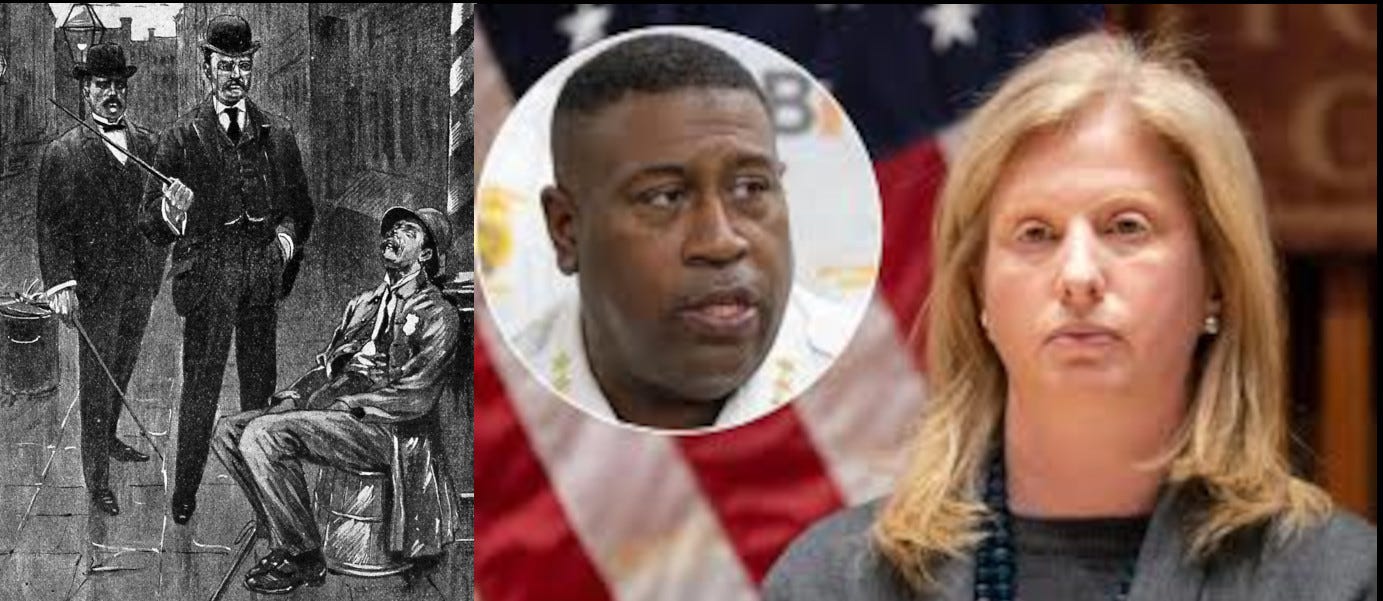
As the head of the NYPD in the 1890s, Roosevelt conducted “midnight rambles,” surprise inspections of officers on duty throughout the city, to weed out corruption and ensure accountability. He systematically removed corrupt officers who had extorted protection money from local merchants and profited from brothels and saloons.
NYPD’s Commissioner Tisch, facing her own crisis of corruption within the NYPD, launched a bold purge days after she became in charge of the dep
 artment. Following explosive allegations that Chief Jeffrey Maddrey traded overtime for sexual favors at police headquarters, Tisch ousted Maddrey, and dozens of high-ranking NYPD officials in a shocking and unprecedented shake-up. Among those removed was Chief of Internal Affairs Miguel Iglesias, signaling her commitment to rooting out misconduct even at the department’s highest levels. This decisive action mirrors Roosevelt’s actions to overhaul a broken and corrupt police force.
artment. Following explosive allegations that Chief Jeffrey Maddrey traded overtime for sexual favors at police headquarters, Tisch ousted Maddrey, and dozens of high-ranking NYPD officials in a shocking and unprecedented shake-up. Among those removed was Chief of Internal Affairs Miguel Iglesias, signaling her commitment to rooting out misconduct even at the department’s highest levels. This decisive action mirrors Roosevelt’s actions to overhaul a broken and corrupt police force.
Update: Two detectives under disgraced ex-NYPD chief Jeffrey Maddrey mired in overtime probe: sources NYPD Overtime Scandal: Failure of Legislative Oversight Laid Bare FBI agents search home of top NYPD official amid allegations he demanded sex for overtime pay NYPD Commissioner Tisch calls for review of car leasing program allegedly abused by top brass: sources
Teddy Roosevelt’s Safety Vision for All vs. Today’s Tisch Ideological Challenges: A Tale of Two Completely Different Progressive Movements
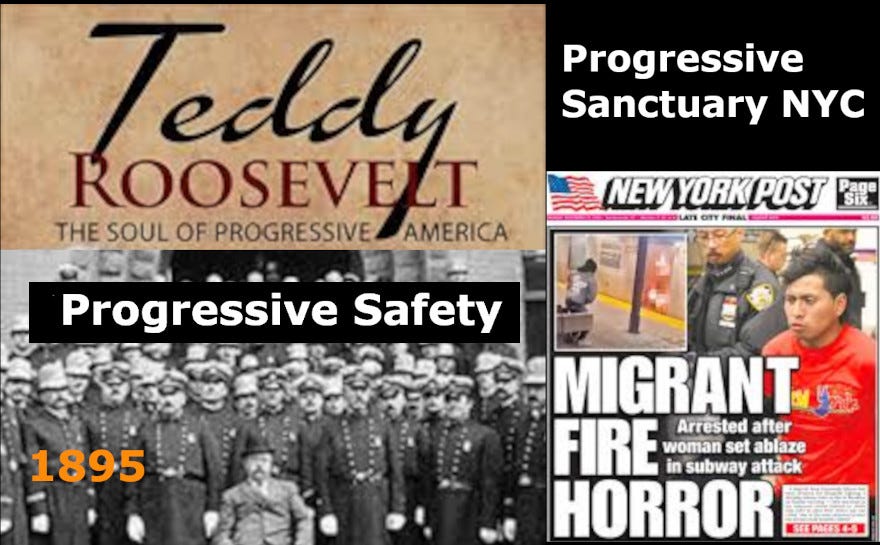
Roosevelt’s involvement in the Progressive Movement started prior to his appointment as head of the NYPD, fueled his passion for government reform whose goal was to improve government service for all the people. As a visionary leader, he saw his role as head of the NYPD as an opportunity to prove progressive movement policies work in the nation’s largest city but also to elevate his influence within the Republican Party. Roosevelt’s progressive vision for government reform drove him to prioritize identifying and removing corrupt police officers who preyed on the city’s residents, aiming to restore trust in the NYPD and provide hope and security to every New Yorker who depended on the department for protection.
In stark contrast, a century later, Roosevelt’s progressive movement has devolved into a series of socialist ideological experiments, spearheaded by elected officials who dominate New York’s government and elections. These policies, including the controversial no-bail law implemented in 2019, caused a 30% surge in crime and are presenting unprecedented challenges for leaders like the new NYPD Commissioner Tisch. The commissioner is now forced to contend with a labyrinth of socialist-driven policies, such as the no-bail law, sanctuary city regulations, and the rise of migrant gangs. These initiatives have not only heightened the dangers faced by New Yorkers but have also severely hampered the NYPD’s ability to effectively combat crime and ensure public safety.
Roosevelt faced Tammany Hall control of the police force, Tisch faces ideological progressive policies allowing career criminals and dangerously mentally ill to dominate the city’s streets and subways. Unlike Roosevelt’s pragmatic approach, which prioritized public safety and law enforcement, Tisch now faces the difficult task of leading the NYPD while contending with politically imposed ideological roadblocks that undermine effective policing and jeopardize the safety of every New Yorker.
While Roosevelt’s leadership was defined by a progressive message rooted in safety and accountability, Tisch’s tenure has become a battle against an entirely different set of ideological progressive goals that undermine public safety. This stark contrast illustrates how the definition and goals of “progressivism” has evolved over the past century—and how these shifts have severely impacted the NYPD’s capacity to protect and serve the city, and the difficulty of the job ahead for Commissioner Tisch. In a recent New York Post article, Commissioner Tisch has already identified the no-bail law as a critical factor perpetuating the revolving door of career criminals within the NY’s justice system. Tisch emphasized how this policy fails to prioritize the rights and safety of victims, ultimately exacerbating the challenges the NYPD faces in maintaining order and public trust.
Both Roosevelt and Tisch: Disrupting Political Patronage with Merit-Based Leadership in the NYPD
As NYPD commissioner in the late 19th century, Roosevelt dismantled a culture where promotions were granted based on political connections to Tammany Hall corruption rather than merit. He introduced civil service exams and established a system where officers were promoted based on their qualifications, integrity, and performance. This shift not only improved the professionalism of the police force but also laid the groundwork for public trust in law enforcement.
In her first weeks Commissioner Tisch has taken similarly bold steps to restore accountability and integrity within today’s NYPD. Upon taking office, Tisch initiated a sweeping overhaul, addressing issues of favoritism and lax overtime oversight within the department. Her administration canceled more than 500 “improper transfers,” where officers connected to the inner circle then running the NYPD were reassigned without proper approval or paperwork, and set strict deadlines for correcting these violations.
In a shocking purge, Tisch removed dozens of high-ranking NYPD officials, starting with the Internal Affairs Bureau (IAB), after allegations surfaced about senior officers engaging in misconduct, including top cop Jeffrey Maddrey allegedly trading overtime for personal favors. Deputy Chief Chris Morello, the second-in-command of the IAB, was removed from his post following revelations of oversight failures. Chief of Internal Affairs Miguel Iglesias and Inspector Joseph Profeta, responsible for investigating high-ranking officers, were also reassigned after their roles were scrutinized for inadequate oversight on overtime abuse.
Both Roosevelt and Tisch faced entrenched corruption and political interference, but their insistence on merit-based leadership has reinforced accountability within the NYPD. By prioritizing qualifications, performance, and ethics, they disrupted a system where favoritism thrived, setting a standard for reform in law enforcement.
Roosevelt and Tisch: Modernizing the NYPD Across Eras

Both Theodore Roosevelt and Jessica Tisch brought modernization to the NYPD, revolutionizing the department to meet the challenges of their respective eras.
As Police Commissioner in the 1890s, Theodore Roosevelt set out to transform the NYPD into a professional, efficient, and accountable force by implementing a wide range of reforms. He instituted rigorous recruitment and disciplinary standards, including entrance exams, to ensure that officers were both physically and mentally fit—marking a stark departure from the previous practice of political patronage. Roosevelt was a strong advocate for integrating modern technologies, overseeing the adoption of standardized equipment, such as the .32 Colt Caliber revolver, and scheduling regular inspections to maintain officer preparedness and uphold department integrity. To improve law enforcement efficiency, he introduced innovative measures like a bicycle squad to enforce traffic laws and ensured that every police station was equipped with telephones for better communication. Roosevelt also introduced meritorious service medals to boost morale and foster pride among officers. His bold reforms not only elevated the professionalism of the NYPD but also laid the foundation for a modern, technologically advanced, and highly effective police force.
Tisch: Technological Innovation and Modern Policing
Tisch brought similar transformative energy to the NYPD during her tenure as Deputy Commissioner for Information Technology (2014–2019). Tisch spearheaded the integration of modern technology into the department, including the implementation of body-worn cameras, equipping every officer with smartphones that allows every officer to receive pictures of wanted criminals instantaneously, and upgrading 911 operations. These innovations streamlined investigating processes, improved accountability, and enhanced the department’s ability to serve New Yorkers effectively.
The Sanitation Department Connection

Jessica Tisch became police commissioner after running the sanitation department. Roosevelt was offered the sanitation commissioner job before he was put in charge of the NYPD.
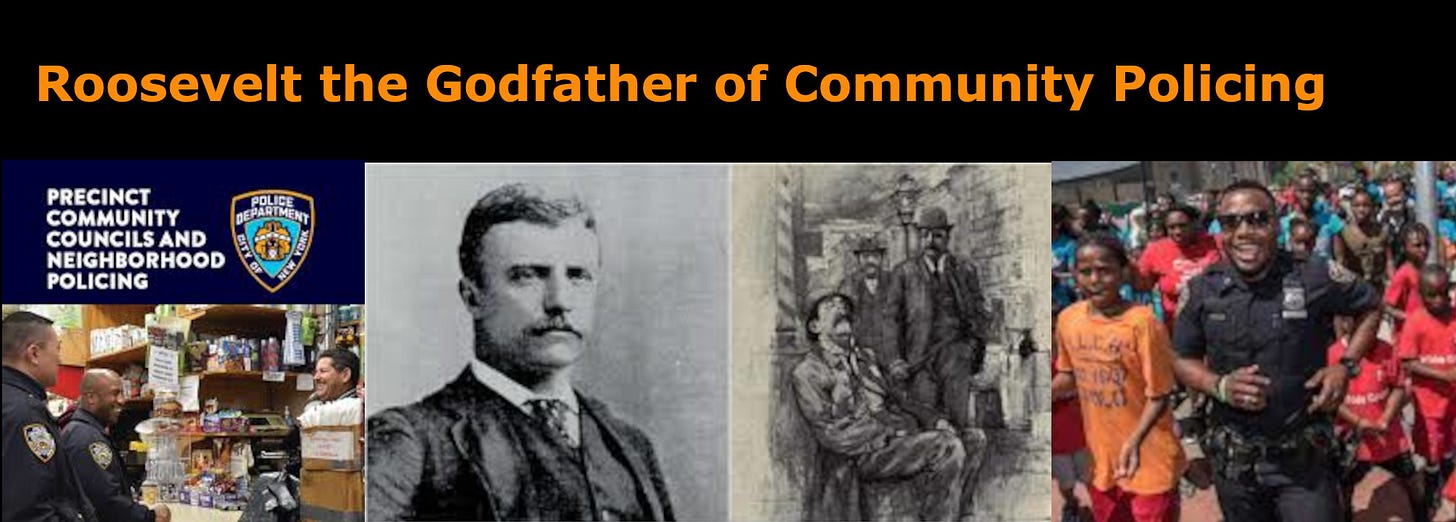
Roosevelt, often hailed as the godfather of American community policing, revolutionized law enforcement by emphasizing accountability, transparency, and engagement with the community. Through his “midnight rambles”- all night walks throughout the city, he ensured officers were present and active, engaged in their neighborhoods, building trust with residents and addressing local concerns. Roosevelt’s reforms prioritized ethical conduct and collaboration, laying the foundation for modern community policing strategies that value trust and partnership between law enforcement and the public. Roosevelt’s approach was guided by the work of Jacob Riis, a journalist and reformer whose groundbreaking book How the Other Half Lives exposed the harsh realities of tenement life. Riis, who walked along with Roosevelt on his midnight police beat walks exposed him to the underbelly of the city’s poor, inspired and influenced Roosevelt’s housing and policing reform progressive policies during his presendency. Together, their efforts reshaped urban governance and improved the lives of countless New Yorkers .
The NYPD Launched Roosevelt’s Career—Will It Do the Same for Tisch?

Roosevelt’s battles with the corrupt Tammany bosses and power brokers controlling the NYPD were so intense that he once lamented, “This is the last office I shall ever hold.” Despite these challenges, his unwavering commitment to use his “Bully Pulpit,” his position as head of the NYPD to push reform and integrity policies for the department, laid the groundwork for his future political success. To Roosevelt’s surprise, his time at the helm of the New York Police Department became a pivotal stepping stone in his rise to national prominence. While he was unable to eradicate Tammany Hall corruption within the NYPD, his two-year tenure was marked by significant contributions that showcased his fearless leadership from the front. Roosevelt’s efforts to professionalize the force and fight entrenched corruption solidified his national reputation as a trailblazing reformer and strengthened his political brand as a leader fighting for change, propelling him toward greater opportunities and ultimately the presidency.
Jessica Tisch, like Roosevelt, has stepped into the role of NYPD Commissioner during a time of crisis. While her future remains to be written, her efforts to modernize and reform the department workforce and leadership echo Roosevelt’s approach. If Commissioner Tisch can effectively engage and keep the trust of the public, navigate the challenges of New York’s dysfunctional political environment—made worse by a no-holds-barred mayoral campaign—while contending with progressive policies such as the no-bail law and sanctuary city regulations, she could position herself as a transformative leader, following in the footsteps of one of America’s most iconic reformers and propelling herself into broader roles of influence.
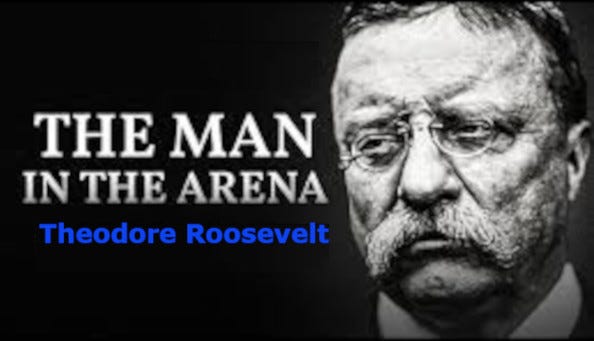
In this era the NYPD commionership is a tall and difficult job, one that demands unwavering resolve, a clear vision, and the ability to navigate complex political and social challenges. As Roosevelt famously stated in his “Arena” speech, it is not the critic who counts, but the man who is actually in the arena, whose face is marred by dust and sweat, striving valiantly. The leaders tasked with safeguarding the public and reforming institutions face immense obstacles, but their ability to rise above these difficulties will determine the future of public safety and the trust placed in those who serve and protect. Like Roosevelt, it is through courage and determination in the face of adversity that progress is made

